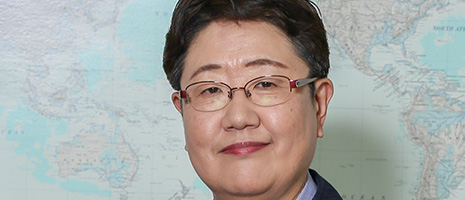Home > Highlighting JAPAN > Highlighting Japan June 2019 > Toward a Multicultural Symbiotic Society
Highlighting JAPAN

Toward a Vibrant and Symbiotic Society
The revised Immigration Control and Refugee Recognition Act, which was passed by the Diet in December 2018 and came into effect in April 2019, brought major changes to the system for admitting foreigners and managing their residence. We interviewed Shoko Sasaki, Commissioner of the newly established Immigration Services Agency, about the background to the revision of the Act and the new system.
What were the main events leading to the revision of the Immigration Control and Refugee Recognition Act?
As a virtuous economic cycle from growth to distribution has been steadily initiated thanks to the promotion of Abenomics, the active job openings-to-applicants ratio was 1.6 times in 2018 when the bill for partial amendment of the Immigration Control and Refugee Recognition Act was submitted to the Diet. Another point to consider is, with the decreasing birthrate and aging population, the working age population (aged 15 to 64) decreases every year and has even dropped to less than 60% of the total population, causing the labor shortage to be a serious problem. To deal with this imminent issue, it was necessary to build a framework as soon as possible to accept work-ready foreign nationals who possess certain expertise and skills in industrial fields where it is difficult to secure a workforce. In this context, the government submitted the bill for partial amendment of the Immigration Control and Refugee Recognition Act to the Diet and it was passed last year.
Why was the Immigration Services Agency established as a part of the revision of the Immigration Control and Refugee Recognition Act?
The number of foreign travelers to Japan continued to increase and hit an all-time high of about 31.2 million in 2018 and the number of foreign residents in Japan also hit an all-time high of about 2.73 million at the end of 2018. In this situation, the government must balance smooth entry examinations and strict immigration controls, and properly manage the residence of an increasing number of foreigners. In addition, it is also necessary to perform new operations, like making plans, framing policies, conducting comprehensive coordination to develop a system of accepting foreigners, and properly dealing with the increasing number of foreign residents along with establishment of new statuses of residence. Under these circumstances, the Ministry of Justice’s Immigration Bureau was reorganized into the Immigration Services Agency.
What is the new system for admitting foreigners?
Based on the Immigration Control and Refugee Recognition Act and other related laws, Japan admitted foreigners under several statuses of employment: Highly-skilled professionals and the like, international students, technical intern trainees1 and temporary visitors, including tourists. But considering the serious shortage of workers, the government decided to add specified skilled workers as a new status of residence.
“Specified skilled worker (i)” is the status of residence for foreign nationals engaging in work requiring skills which need considerable knowledge or experience belonging to specified industrial fields. “Specified skilled worker (ii)” is the status of residence for foreign nationals engaging in work requiring proficient skills belonging to specified industrial fields.
“Specified Industrial Fields” include fourteen fields2, including Nursing Care and Building cleaning management. Specified skilled worker (ii) is only applicable for the construction industry and the shipbuilding and ship machinery industry.
For people who receive the status of residence of specified skilled worker (i), their maximum period of residence is five years in total. Skill level is confirmed by exams. Level of Japanese-language proficiency is confirmed by exams related to Japanese language proficiency required for everyday living and business. Accompaniment by family members is basically not permitted. Foreign nationals who have completed technical intern training (ii) with good results will be exempted from taking tests.
What efforts are being made to accept foreigners under the new system?
It is important to construct an environment for accepting foreigners to realize a vibrant, symbiotic society in which the Japanese people and foreigners can respect each other. Based on the Comprehensive Measures for Acceptance and Coexistence of Foreign Nationals, which was drawn up in December 2018, the government will carry out various measures, including support for local governments to set up one-stop help desks for foreigners.
In addition, the government will also promote the merits of working in rural areas so that foreigners will show interest in working in rural areas as well as big cities.
What are your aspirations for the future?
We will properly manage and operate the new “Specified skilled worker” status of residence system so that it will be welcomed by both Japanese society and foreign workers. In addition, to realize a better symbiotic society with foreigners, we will work hard so that the Immigration Services Agency can exert a strong comprehensive coordination capability. We will also work hard to make the Immigration Services Agency an organization that is trusted by people inside and outside of the country.
Note:
1 Technical intern trainees are foreigners who reside in Japan to acquire skills and knowledge under the technical intern training system intended to transfer skills to developing countries.
2 Nursing Care, Building cleaning management, Forges and foundries, Machine parts & tooling industries, Electric, electronics and information industries, Construction industry, Shipbuilding/ship machinery industry, Automobile maintenance, Aviation industry, Accommodation industry, Agriculture, Fishery & aquaculture, Manufacture of food and beverages, Food service industry.
© 2009 Cabinet Office, Government of Japan






